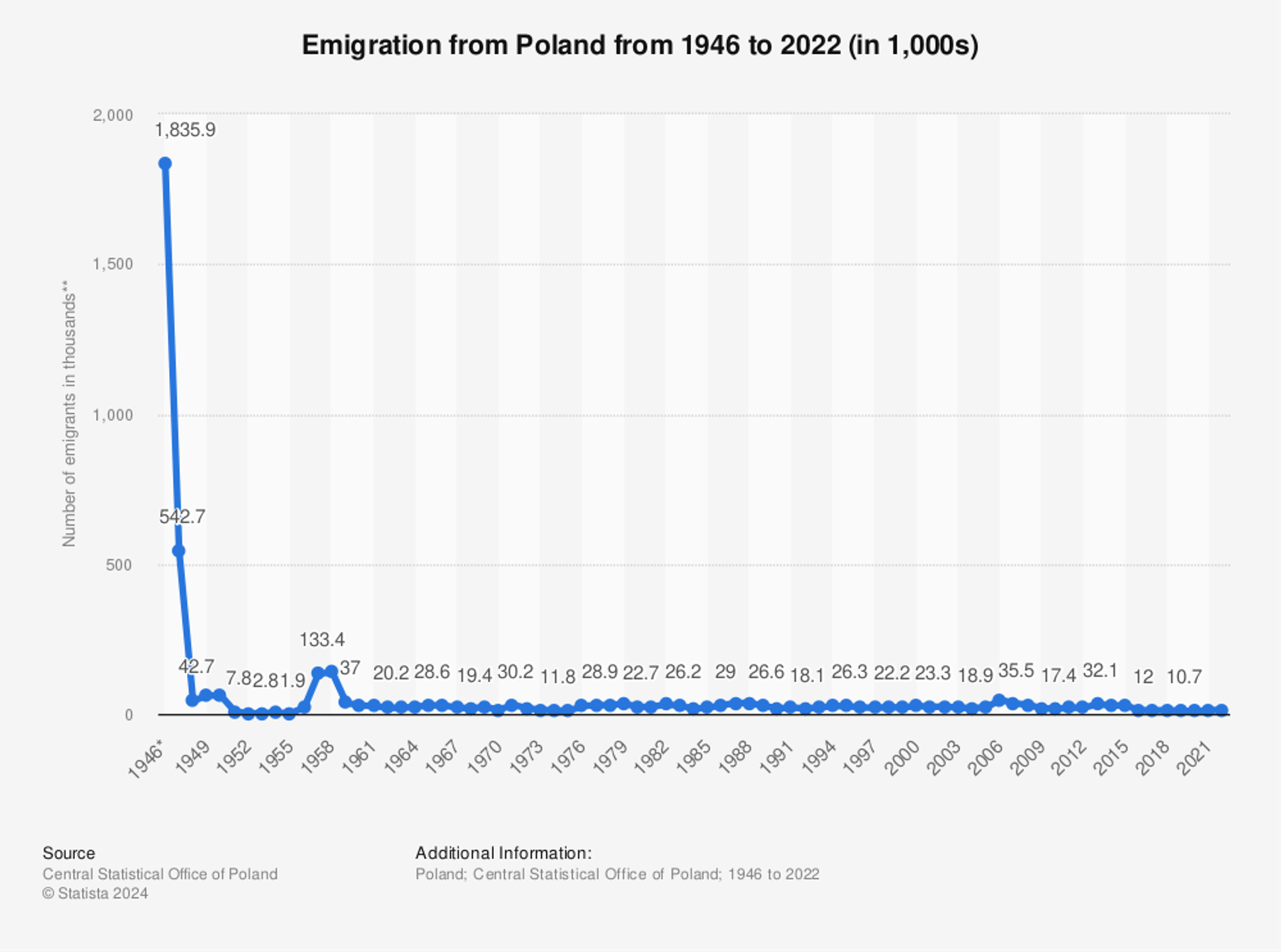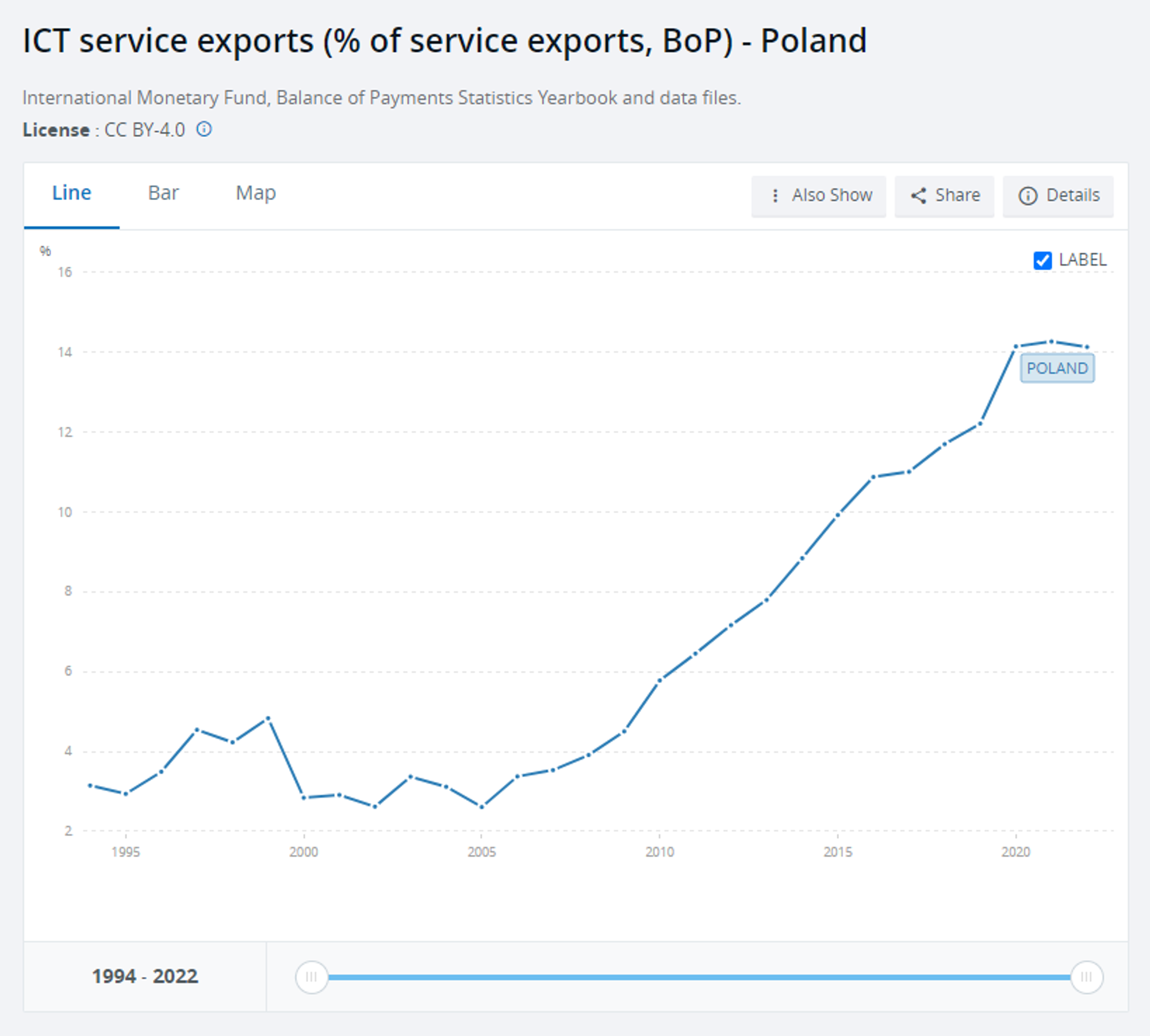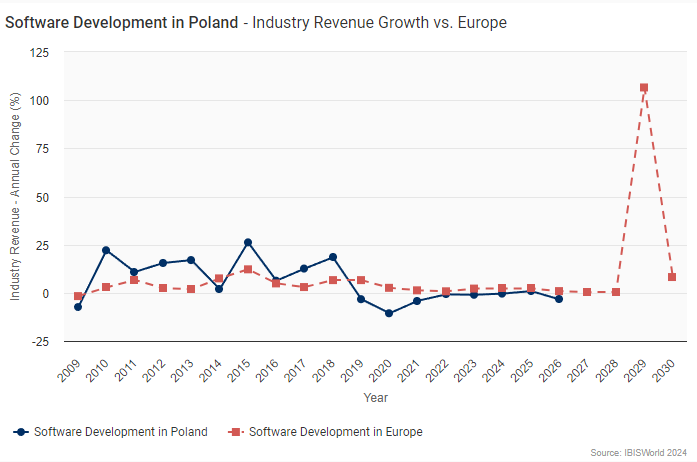Reverse Brain Drain - What It Means for the Polish IT Sector

Emigration has always been a constant phenomenon in many countries, people looking for a better life, a better job, reuniting with their families, or circumstances such as war forced people to leave their homes. Poland is one such region that has experienced many changes, but despite all that, it remains a strong and stable country. However, even it has not been spared the fate of migration of intelligent people in different periods, by such an effect as brain drain.
In this article, we will look at indicators of emigration, what reverse brain drain is, why people leave and return home, and how it is affected by and affects the economic growth of Poland and the entire region. By analyzing key values and history, we will be able to highlight the main factors and obstacles for people to return home. And how emigration is affected by the accession to the European Union and the overall economic growth in the region and Poland.
Brief Stats on Poland's Emigration
A wave phenomenon has always characterized emigration in Poland which is still considered a country of emigration, but this trend has been changing recently. In certain periods in the twentieth century, polish people's emigration can be characterized by several large waves. According to research by Hamburgisches WeltWirtschaftsInstitut gemeinnützige GmbH HWWI, in 1968 there was a major wave of 250.000 Polish Jews left the country. After there was a certain liberalization of visa rules by Western Countries which ended in the 1980s. In the 1980s another wave of emigration happened due to martial law and suppression. After becoming a European Union member, the emigration phenomenon in Poland is mostly affected by easy access to the Western developed countries, mostly the United Kingdom (31%), Germany (20%), and the United States (11%) according to research done by Central Statistical Office (Central Population Register – PESEL).

Source: Central Statistical Office of Poland, Statista 2024
What Does Reverse Brain Drain Mean?
In simple words, reverse brain drain is a phenomenon where the population, mostly highly educated professionals, moves from more developed foreign countries to their home countries. Reverse brain drain is mostly related to students who gained education in developed countries and to people of scientific, creative, or engineering professions, such as IT specialists, software developers, designers, marketers, and others.
Reverse brain drain is usually considered a phenomenon in developing countries and is directly linked to economic growth. However, government policies, internships, training programs, and other ways to improve the lives of returning students and professionals have a significant impact on boosting reverse brain drain.
Why Are Polish Professionals Returning Home?
There are several reasons for Polish professionals to return home:
-
Improved Living Standards:
Poland is rapidly developing and with it the infrastructure, public services, and other important components of life. At the same time, life in Poland is still much cheaper than in many Western developed countries. Thanks to this, professionals working in Poland can get much better living and development conditions for the same price, with the development of technology and remote work, this is even more realistic.
-
Economic Growth: The Polish economy is developing rapidly, which results in new jobs for professionals, and improving working conditions and salaries. This allows professionals to increasingly consider vacancies in Polish companies, and the country to attract more taxes, which contributes to further economic growth.
-
Technological Advancement: Technological giants such as Microsoft, and Google are opening their hubs in Poland, which creates and boosts a powerful and developed tech ecosystem with a significant number of highly qualified professionals and creates opportunities for business, networking, education, and collaboration.
-
Family and Social Ties:
Poland is considered a fairly conservative and patriotic country with strong family ties, which may encourage professionals to return home to their relatives and friends. This can make them feel more stable and happy. And thanks to its culture and traditions, it allows them to maintain a work-life balance. All these aspects can improve the quality of life and make workers feel more stable and happy.
Even when looking at these factors, we must take into account that things vary by age, marital status, and region. Younger people are more open-minded and mostly committed to career development and investing all their efforts in it. Older people, married people, and people with children prefer work-life balance. Industry of the economy and business sector has an influence as well, as the greater the demand for specialists of certain categories, the more companies try to attract them to return home.
The Role of Economic Growth and Eu Membership in Poland’s Reverse Brain Drain

Source: International Monetary Fund, Balance of Payments Statistics Yearbook and data files.
Let's now look at economic development and the role of the European Union. We mentioned earlier that Poland’s economic growth positively impacts reverse brain drain. This factor has a significant impact, as it creates new jobs, higher salaries, and career prospects.
This is especially evident in some specific industries such as IT, manufacturing, and engineering, and creates many opportunities for specialists to find their place and develop steadily and efficiently. The Polish IT sector aims at robust growth by 7.6% with ambitions to reach a formidable volume of around $11.14 billion by 2024, making it one of the fastest-growing sectors.
In addition, Poland has a fairly convenient tax system (the Standard Income Tax rate for IT companies is 19%) and it is considerably easy to register a company. This can be done from the comfort of your home using government online services
Access to the European Union and market expansion at one time intensified the brain drain, many specialists were looking for opportunities in the UK and other Western developed countries. But later the state changed. From 2016 to 2020 Polish government invested heavily in tech funds and startup incubators attracting new investors and product companies to work in the Polish market, promising to invest $10 billion each year in the next 25 years. This attracts professionals to return to their home country and companies to look for opportunities in the Polish IT services market. One such company is Movadex, which has successfully integrated into the Polish IT ecosystem. UK's exit from the European Union, the so-called Brexit, also has an impact. The flow of people from the United Kingdom increased and there was a significant interest in finding opportunities at home.
The Comparison of Revenue in Poland Vs Rest of the EU

Source: Central Statistical Office of Poland, Statista 2024
The next interesting topic is IT sector revenue and the state of the economy in Poland and the European Union. According to IBIS World 2024 research, the Polish IT services sector is performing well, with an estimated value of approximately $8.1 billion in 2024 and ranking 7th out of 26 countries in Europe positions Poland as a significant player in the IT services market, competing with economies like Germany and Ireland
The number of companies has been growing and exceeded 3% annually for the past 5 years indicating a growing ecosystem with a potential for more innovation and an increasing number of jobs. IT sector in Poland is attracting investments, fostering business creation, and showing that it is a great competitor.
Challenges of People Returning After a Long Time
Returnees may experience some difficulties with adaptation, the main factors being:
-
Cultural and Lifestyle Shift Living outside the familiar working environment distorts the regular work-life balance. People who have left the country must undergo a hard period of adaptation to get used to the new lifestyle.
-
Professional Reintegration Different regions may vary the need for specialists. Although for IT specialists who work remotely, the impact is not significant, the presence or absence of IT associations or hubs such as Warsaw, Poland, and Wroclaw in some cities significantly influence and boost professional reintegration and adaptation.
-
Loss of Professional Network
It can be difficult to build new working relationships after a long time of inactivity. Reviewing existing opportunities and ways to make new contacts can take significant time and effort.
However, returning home also has great advantages, such as reunion with family and old friends, helping to grow the economy of your home country, and emotional ones, as your home place often seems more comfortable. Furthermore, Polish IT companies such as Movadex try hard to make each employee's work process as smooth and convenient as possible.
To Summarise
Brain Drain is a big challenge for countries. Today’s Poland is making great progress in its development and attracting professionals back home. Thanks to this, specialists who return home can feel safe, develop their careers, and with this help develop the country itself.
The Polish market now is a market of opportunities with a large number of talented highly motivated professionals, and this number is growing every year. We hope this trend will continue and work for industry development and the common good.